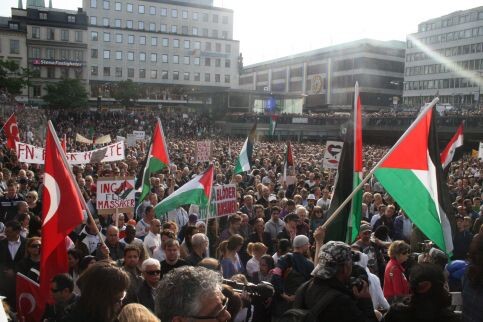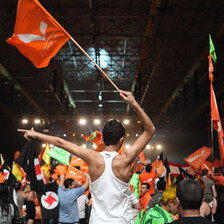The Electronic Intifada Stockholm 31 May 2010

Protestors gather at Sergels Torg square. (Assaad Thebian)
The central Sergels Torg square in Stockholm is not the place you would normally expect to hear the words “stop the blockade,” or “boycott Israel,” or even “In our souls and with our blood we support you Palestine,” in Arabic no less.
But that is what happened as thousands of people descended on the square on 31 May in support of the Freedom Flotilla, the name given to the convoy of six passenger and aid ships attacked by the Israeli military in international waters early that morning.
Predominantly Palestinian and Turkish flags flew high above the square as thousands of Swedes of all backgrounds gathered to protest Israel’s actions.
“This is something that Israel has been doing for a long time and it’s obvious that this is contrary to international law no matter how you view the conflict,” said Magnus Alfonson, 25. The sense of anger amongst the crowd was evident in the somber manner that they gazed upon the speakers who stood atop a staircase surrounded by demonstrators many wearing traditional Palestinian kuffiyeh scarves.
Sweden has had rocky relations with Israel in the last year after a Swedish journalist alleged that Israel had stolen organs from Palestinians for use in transplants during the 1990s. Sweden, as did Turkey, Denmark and Greece and several other countries, also summoned the Israeli ambassador in Stockholm for questioning over the fate of some 11 Swedish citizens that were among the passengers of the flotilla which included one Swedish-owned and flagged vessel.
“We want a clarification over what has happened,” Swedish Foreign Minister Carl Bildt told Sveriges Radio. “We know that there are Swedes on some of the ships and we want to know what has happened to them. There appears no reason to question media reports that a Turkish vessel has been boarded, that a fire fight occurred and that people have been killed.”
One of those citizens is world best-selling Swedish author Henning Mankell. Another is Emile Sarsour, a dual Swedish-Palestinian citizen born in a refugee camp in Syria, according to his daughter Samaa Sarsour, a 26 year-old activist and organizer of the protest. While at the demonstration she stated she had just received a phone call from the Swedish foreign ministry telling her that the Swedish embassy in Israel had been denied access to her father and that he was at the Beersheva prison in Israel. She added the official on the phone said the Israeli authorities had said that “maybe” they would gain access to her father the following day.
“It’s obvious that no matter where you stand on the issue, this is a crime against a nonviolent organization,” said Daniel Free, a Jewish Swede also present at the protest.
“Israel must be brought to the international court of justice,” said Zaida Catalan, legal advisor for the local Green Party in the Swedish Parliament to resounding applause before the crowd dispersed.
As for the Swedes still being detained by Israel, their fate remains unclear. However, their resolve may be less ambiguous. “When I told my father I was scared before he left,” said Sarsour, “he said to me that if he as a Palestinian could not do this; who else would?”
Sami Halabi is a Beirut-based journalist and editor who covers the Middle East and North Africa. Assaad Thebian is a Beirut-based journalist.





